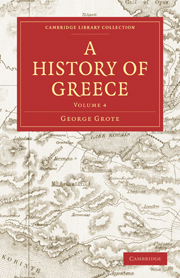Book contents
- Frontmatter
- Contents
- PART II CONTINUATION OF HISTORICAL GREECE
- CHAPTER XXV Illyrians, Macedonians, Pæonians
- CHAPTER XXVI Thracians and Greek Colonies in Thrace
- CHAPTER XXVII Kyrênê.—Barka.—Hesperides
- CHAPTER XXVIII Pan-Hellenic Festivals—Olympic, Pythian, Nemean and Isthmian
- CHAPTER XXIX Lyric Poetry.—The Seven Wise Men
- CHAPTER XXX Grecian Affairs during the Government of Peisistratus and his Sons at Athens
- CHAPTER XXXI Grecian Affairs after the Expulsion of the Peisistratids.—Revolution of Kleisthenês and Establishment of Democracy at Athens
- CHAPTER XXXII Rise of the Persian empire.—Cyrus
- CHAPTER XXXIII Growth of the Persian Empire
- CHAPTER XXXIV Dêmokêdês.—Darius invades Scythia
- CHAPTER XXXV Ionic Revolt
- CHAPTER XXXVI From Ionic Revolt to Battle of Marathon
- CHAPTER XXXVII Ionic Philosophers.—Pythagoras.—Kroton and Sybaris
- Titles in the Series
CHAPTER XXXVI - From Ionic Revolt to Battle of Marathon
Published online by Cambridge University Press: 29 August 2010
- Frontmatter
- Contents
- PART II CONTINUATION OF HISTORICAL GREECE
- CHAPTER XXV Illyrians, Macedonians, Pæonians
- CHAPTER XXVI Thracians and Greek Colonies in Thrace
- CHAPTER XXVII Kyrênê.—Barka.—Hesperides
- CHAPTER XXVIII Pan-Hellenic Festivals—Olympic, Pythian, Nemean and Isthmian
- CHAPTER XXIX Lyric Poetry.—The Seven Wise Men
- CHAPTER XXX Grecian Affairs during the Government of Peisistratus and his Sons at Athens
- CHAPTER XXXI Grecian Affairs after the Expulsion of the Peisistratids.—Revolution of Kleisthenês and Establishment of Democracy at Athens
- CHAPTER XXXII Rise of the Persian empire.—Cyrus
- CHAPTER XXXIII Growth of the Persian Empire
- CHAPTER XXXIV Dêmokêdês.—Darius invades Scythia
- CHAPTER XXXV Ionic Revolt
- CHAPTER XXXVI From Ionic Revolt to Battle of Marathon
- CHAPTER XXXVII Ionic Philosophers.—Pythagoras.—Kroton and Sybaris
- Titles in the Series
Summary
In the preceding chapter, I indicated the point of confluence between the European and Asiatic streams of Grecian history—the commencement of a decided Persian intention to conquer Attica; manifested first in the form of a threat by Artaphernês the satrap, when he enjoined the Athenians to take back Hippias as the only condition of safety, and afterwards converted into a passion in the bosom of Darius in consequence of the burning of Sardis. From this time forward, therefore, the affairs of Greece and Persia come to be in direct relation one with the other, and capable of being embodied, much more than before, into one continuous narrative.
The reconquest of Ionia being thoroughly completed, Artaphernês proceeded to organise the future government of it, with a degree of prudence and forethought not often visible in Persian proceedings. He convoked deputies from all the different cities, and compelled them to enter into a permanent convention, for the amicable settlement of disputes, so as to prevent all employment of force by any one against the others: moreover he caused the territory of each city to be measured by parasangs (each parasang was equal to thirty stadia, or about three miles and a half), and arranged the assessments of tribute according to this measurement, without any material departure, however, from the sums which had been paid before the revolt.
- Type
- Chapter
- Information
- A History of Greece , pp. 418 - 508Publisher: Cambridge University PressPrint publication year: 2010First published in: 1847

